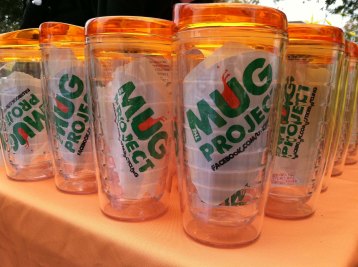 KNOXVILLE — University of Tennessee, Knoxville, employee Kimberly Murphy stands in line at the John C. Hodges Library Starbucks, reusable mug in hand. She’s waiting to get a discounted iced coffee before heading to her office. Like many UT students and employees, Murphy is taking advantage of UT’s Mug Project, a progressive new sustainability campaign.
KNOXVILLE — University of Tennessee, Knoxville, employee Kimberly Murphy stands in line at the John C. Hodges Library Starbucks, reusable mug in hand. She’s waiting to get a discounted iced coffee before heading to her office. Like many UT students and employees, Murphy is taking advantage of UT’s Mug Project, a progressive new sustainability campaign.
The Mug Project is a campus-wide effort to reduce waste and save resources. The majority of campus dining locations serve beverages to customers in single-use disposable cups, most of which are paper.
UT students, faculty, and staff can bring their own mug of twenty-four ounces or less and receive ninety-nine-cent drip coffee and fountain beverages, a savings of forty cents or more. The program also offers 15 percent off specialty coffee beverages. More than 90 percent of Volunteer Dining locations are participating, including Starbucks, Einstein’s, Quiznos, and Subway.
To make the project even sweeter for the UT community, Eastman Chemical Co. of Tennessee donated 600 high quality, US-made reusable mugs, which were given away to students, faculty, and staff on Wednesday, October 12, on the Pedestrian Walkway.
Emmy Waldhart, AmeriCorps member serving with UT Recycling, says the Mug Project’s goal is to prevent 100,000 single-use cups, approximately 10 percent of the campus community’s annual cup purchases, from entering area landfills by August 2012.
In the two months since the project began, more than 9,600 cups have avoided a one-way ticket to the landfill, and UT is on track to reach its goal.
UT’s 27,000 students consume an estimated 3,225 cups per day. Over the course of a year, that requires 485 trees, 290,000 gallons of water, and 360 million BTUs of energy—enough to power four households for a year, says Samantha Wentworth, Volunteer Dining sustainability project coordinator.
Paper cups are designed for single use and cannot be recycled due to the waxy exterior coating that makes them leak-proof and heat-resistant. Manufacturing and shipping paper cups to university campuses is an expensive process, the costs of which are passed down to consumers.
To combat the paper cup waste issue directly, Wentworth and Waldhart teamed up to create the Mug Project. It’s been a long yet rewarding process for both women, who dedicated eight months to determining project feasibility, researching other North American universities with similar reusable mug programs, and obtaining buy-in from UT campus dining vendors.
Their research found that other American and Canadian campuses with similar reuse programs have been successful in changing consumer behavior, with many remembering to bring a reusable mug each day.
“It’s becoming a national and global trend to move away from single-use and back to reusable products. Single-use products have only been around for a few decades and we are already realizing that we cannot sustain a throw-away culture. This project gives UT the opportunity to join the movement,” says Waldhart.
Wentworth and Waldhart hope adopting reusable containers will become second nature to the campus community and spotlight UT and Volunteer Dining as leaders in campus sustainability improvements.
“We want the Mug Project at UT Knoxville to become a model that Aramark can easily bring to other campuses across the U.S. and say, ‘Look, here’s what we did at UT, and it’s so easy, your campus can do it, too,’” says Wentworth.
Murphy, who works for UT’s Center for International Education, considers the program a success.
“Every time I come to Starbucks at Hodges Library, the cashiers know my drink order and know I have my own mug. It’s a really simple and effective program, and I love getting the discount price.”
“Ten percent of disposable cup purchases is an ambitious goal, but it’s feasible,” says Waldhart. “This is the first year of the program, and we anticipate that it will keep growing. It has the potential to make a huge environmental impact, and it begins right now with getting people on board.”
For more information on the Mug Project, visit https://www.facebook.com/utkrecycling. For more information on Volunteer Dining and ARAMARK’s sustainability efforts, visit http://web.utk.edu/~utdining/. For more information on UT campus sustainability efforts, visit http://environment.utk.edu.
—
C O N T A C T :
Emmy Waldhart (865-974-3480, ewaldhar@utk.edu)
Samantha Wentworth (865-974-0335, wentworth-samantha@aramark.com)